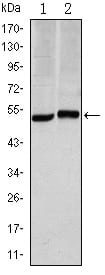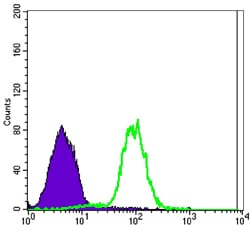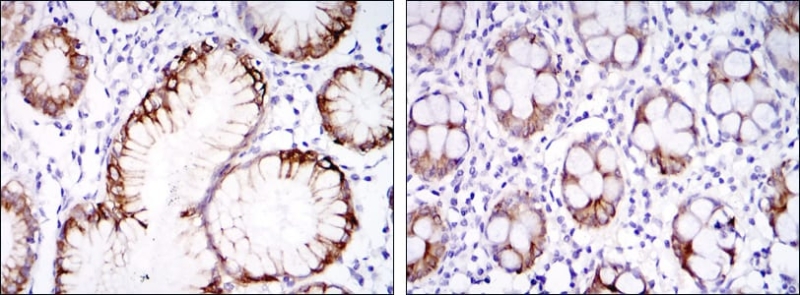


| WB | 1/500 - 1/2000 | Human,Mouse,Rat |
| IF | 咨询技术 | Human,Mouse,Rat |
| IHC | 1/200 - 1/1000 | Human,Mouse,Rat |
| ICC | 技术咨询 | Human,Mouse,Rat |
| FCM | 1/200 - 1/400 | Human,Mouse,Rat |
| Elisa | 1/10000 | Human,Mouse,Rat |
| Aliases | MN; CAIX; CA9 |
| Entrez GeneID | 768 |
| clone | 2D3 |
| WB Predicted band size | 50kDa |
| Host/Isotype | Mouse IgG1 |
| Antibody Type | Primary antibody |
| Storage | Store at 4°C short term. Aliquot and store at -20°C long term. Avoid freeze/thaw cycles. |
| Species Reactivity | Human |
| Immunogen | Purified recombinant fragment of human CA9 expressed in E. Coli. |
| Formulation | Purified antibody in PBS with 0.05% sodium azide. |
+ +
以下是关于CA9抗体的3篇参考文献及其摘要:
1. **"Monoclonal antibodies against carbonic anhydrase IX: Novel tools for histopathological diagnosis of renal cell carcinoma"**
*作者:Oosterwijk, E., et al. (2003)*
摘要:该研究开发了针对CA9的单克隆抗体(如G250),证实其在肾细胞癌(RCC)中的高特异性表达,提出其作为RCC病理诊断的可靠标志物,并探讨其在靶向治疗中的潜力。
2. **"Carbonic anhydrase IX as a biomarker for imaging and therapeutic targeting in hypoxic tumors"**
*作者:Chiche, J., et al. (2009)*
摘要:文章系统分析了CA9在肿瘤缺氧微环境中的调控机制,验证了其抗体在肿瘤成像(如PET显像)和治疗中的双重应用价值,强调其作为预后标志物和药物递送载体的潜力。
3. **"Targeting CAIX with antibody-based therapeutics in oncology: Current status and future perspectives"**
*作者:Liao, S.Y., et al. (2017)*
摘要:综述了CA9抗体(如cG250、M75)在癌症诊疗中的研究进展,包括抗体偶联药物(ADC)和免疫治疗策略,总结了临床试验结果及优化抗体疗效的挑战。
*注:若需更多文献,可补充一篇关于CA9抗体机制的研究:*
4. **"Hypoxia-induced CA IX regulates cancer cell migration through pH modulation"**
*作者:Svastová, E., et al. (2004)*
摘要:通过CA9抗体阻断实验,揭示CA9通过调节细胞外pH促进肿瘤细胞迁移和侵袭的机制,为靶向CA9抑制转移提供理论依据。
Carbonic anhydrase IX (CA9) is a transmembrane enzyme involved in pH regulation and cellular response to hypoxia. It is encoded by the *CA9* gene and is primarily expressed in certain epithelial tissues. CA9 gained prominence due to its overexpression in various cancers, particularly clear cell renal cell carcinoma (ccRCC), where it serves as a biomarker linked to the hypoxia-inducible factor (HIF) pathway. Its role in tumorigenesis includes maintaining intracellular pH balance under hypoxic conditions, promoting cell survival, and facilitating metastasis.
CA9 antibodies are tools designed to detect or target this protein in research and clinical settings. In diagnostics, CA9-specific monoclonal antibodies (e.g., M75. G250) are used in immunohistochemistry to identify ccRCC and other malignancies, aiding in differential diagnosis. Therapeutically, anti-CA9 antibodies like girentuximab have been explored for targeted drug delivery or radioimmunotherapy, leveraging CA9's tumor-specific expression. However, clinical trials have shown mixed outcomes, highlighting challenges in specificity and efficacy.
Research continues to explore CA9's mechanistic roles in cancer progression and its potential as a prognostic marker. Recent studies also investigate its expression in non-cancer contexts, such as inflammatory diseases. Despite limitations, CA9 remains a key focus in developing precision oncology strategies.
×